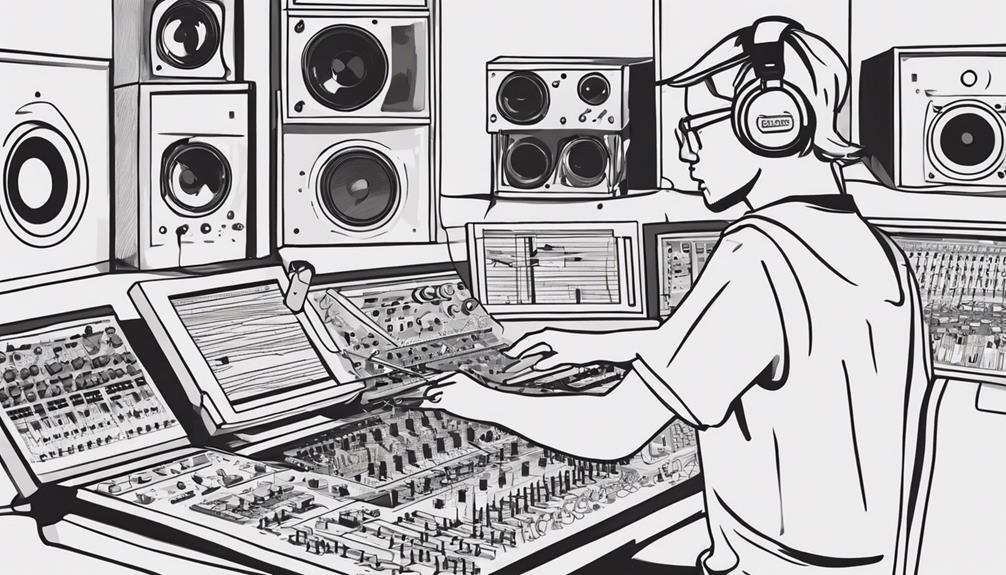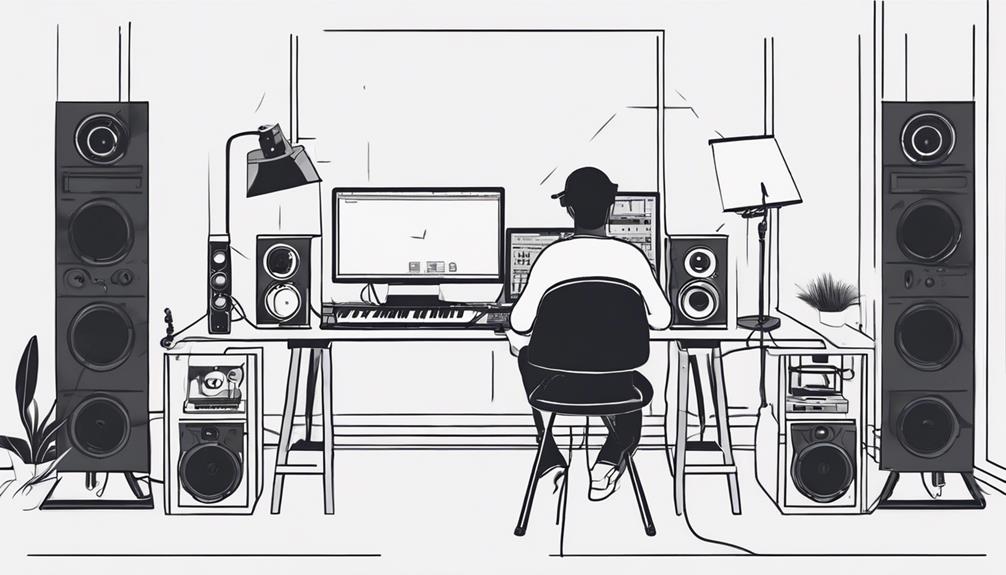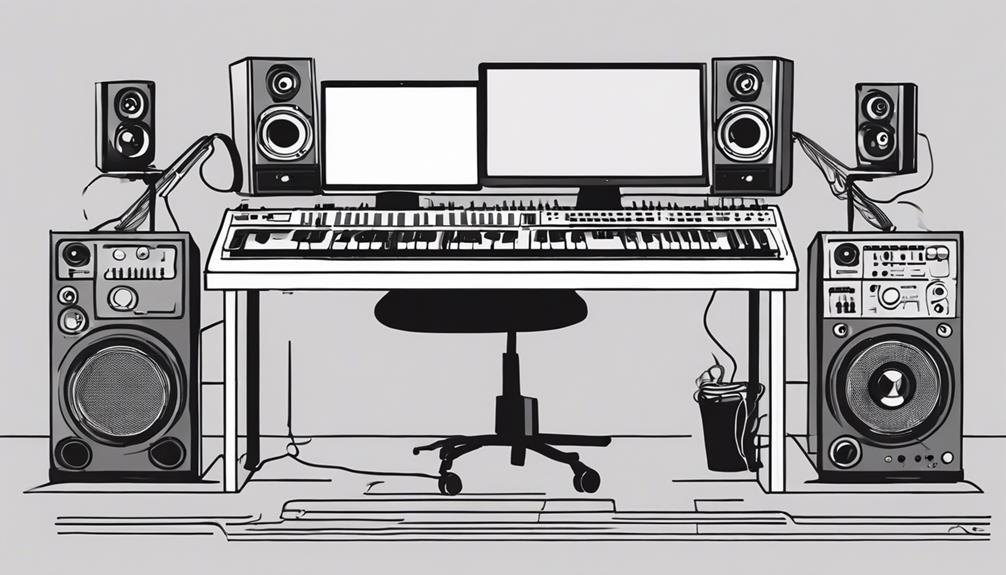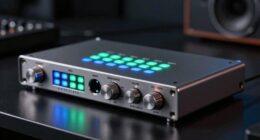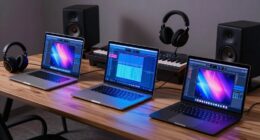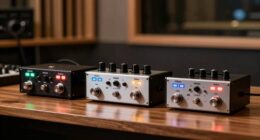If you're ready to pursue music production education, start by prioritizing accredited programs. Evaluate the curriculum, faculty, and facilities to find the best fit. Consider program costs, financial aid, and internships. Don't forget hands-on experience opportunities. Next, explore alternative paths like online courses and apprenticeships. Networking is key for future success; connect with industry professionals and attend events. Essential equipment includes a computer with DAW and MIDI keyboard. Developing skills in theory, software, and audio techniques is essential. Balance passion with dedication, and navigate the industry by staying updated on trends. Your journey in music production awaits!
Key Takeaways
- Research accredited programs with comprehensive curriculum.
- Evaluate faculty expertise, facilities, and industry connections.
- Consider costs, financial aid options, and scholarships.
- Prioritize hands-on experience, internships, and projects.
- Explore alternative paths like online courses and apprenticeships.
Researching Music Production Schools
When considering pursuing a career in music production, researching schools that offer accredited programs is essential for your future success. Look for music production schools with accreditation from organizations like the National Association of Schools of Music (NASM) or the Accrediting Commission of Career Schools and Colleges (ACCSC). Check the program's curriculum, faculty expertise, and available facilities, such as state-of-the-art recording studios and equipment.
Additionally, explore the school's alumni success rate and industry connections. This information can offer you valuable networking opportunities and insights into the potential career path that lies ahead.
By comparing tuition costs, financial aid options, and potential scholarships, you can make an informed decision that aligns with your goals.
Furthermore, investigate schools that offer internships, job placement assistance, and hands-on experience in the music production field. These opportunities can provide you with practical skills and industry knowledge that will be invaluable as you start on your music production career.
Evaluating Program Offerings
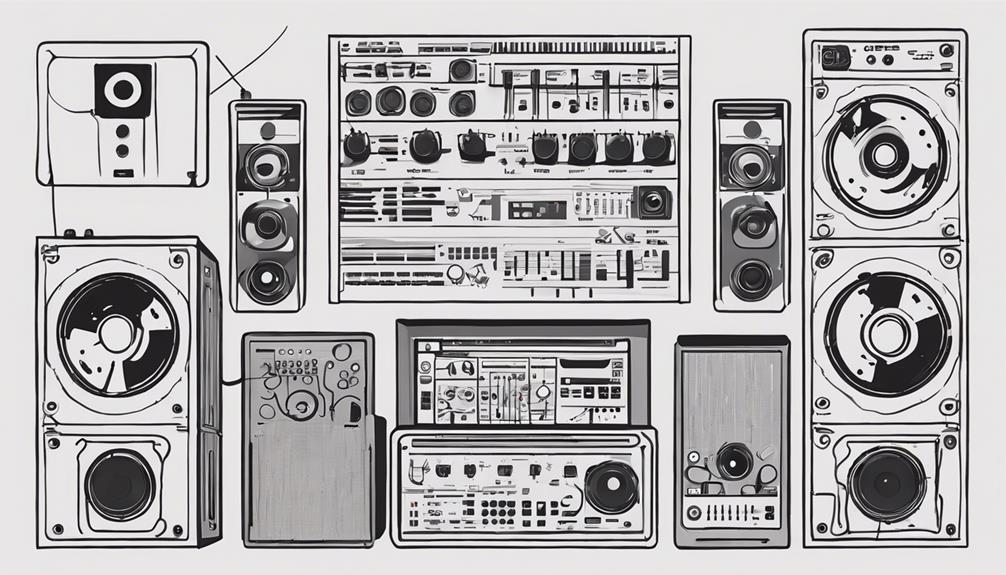
To effectively evaluate program offerings in music production schools, assess the curriculum's scope, faculty expertise, and available hands-on experience opportunities.
Look for a curriculum that covers music theory, audio engineering, production techniques, and industry trends to guarantee a well-rounded education.
Hands-on experience is essential, so prioritize programs that offer studio time, internships, and projects to apply what you learn in real-world settings.
Faculty experience and industry connections are also important for networking and mentorship opportunities that can boost your career prospects.
Additionally, consider the program's facilities, recording studios, music production tools, and software to ensure you have access to industry-standard equipment for practice and projects.
Check for accreditation, as it signifies quality standards, and research alumni success and post-graduation support for insights into career advancement opportunities.
Considering Costs and Financial Aid
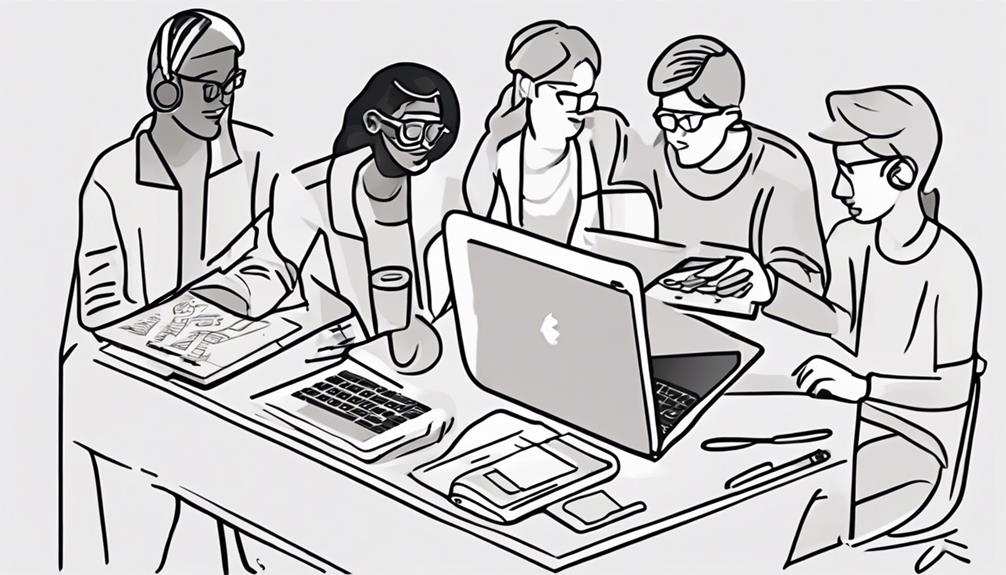
Considering costs and available financial aid options is essential when planning your education in music production. Tuition fees for music production programs can vary widely, ranging from $5,000 to $50,000 per year. Additionally, housing costs can be significant, ranging from $500 to $2,000 per month, depending on factors like location and housing type. Transportation expenses, which can range from $50 to $200 per month, should also be factored into your budget based on the school's location.
Furthermore, specialized equipment such as digital audio workstations (DAWs) and microphones can add up, costing between $500 to $2,000 or more.
To help offset these costs, it's vital to explore financial aid options, scholarships, and work-study programs. These resources can provide valuable assistance in managing tuition fees, housing expenses, transportation costs, and purchasing necessary equipment. By researching and applying for financial aid opportunities, you can make pursuing your education in music production more financially feasible.
Exploring Alternative Education Paths
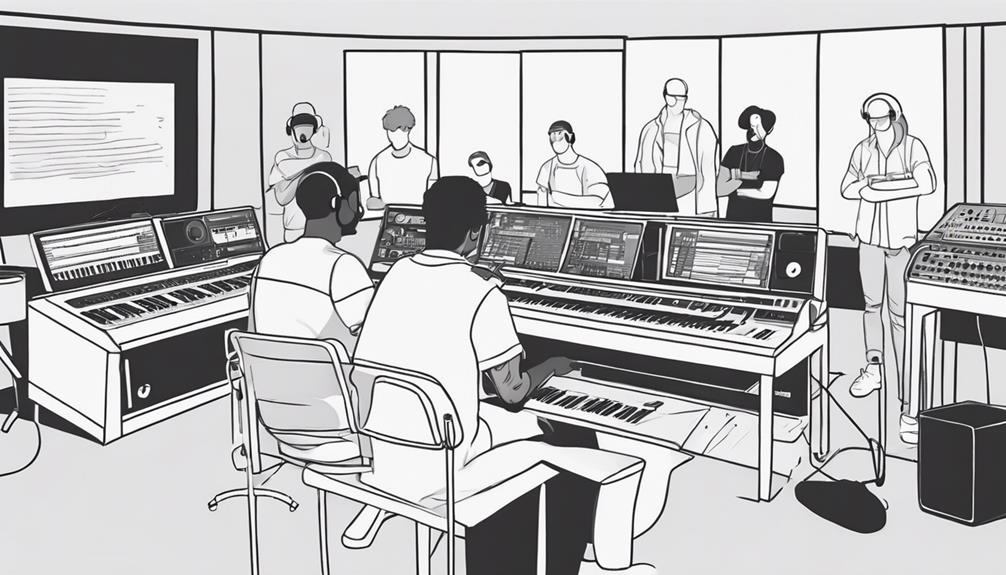
When considering alternative education paths for music production, think about the benefits of online courses taught by industry professionals.
These courses offer flexibility and accessibility, allowing you to learn at your own pace and from the comfort of your home.
Additionally, explore apprenticeship opportunities to gain hands-on experience and learn directly from seasoned professionals in the field.
Online Courses Benefits
Exploring alternative education paths for music production, you can benefit greatly from enrolling in online courses. Learn music production from industry professionals at your own convenience with the flexibility online courses offer. These courses often feature interactive lessons, assignments, and feedback to enhance your understanding and skills.
What's more, online courses come at affordable costs compared to traditional schools, making quality education more accessible. You'll have access to a variety of resources, tutorials, and tools, all just a click away with an internet connection. In the comfort of your own space, you can immerse yourself in the world of music production, guided by experts and enriched with interactive learning experiences.
Embrace the opportunities that online courses provide to develop your passion for music production efficiently and effectively.
Apprenticeship Opportunities
Apprenticeship opportunities in music production offer aspiring individuals a hands-on learning experience alongside seasoned professionals in real-world environments. Through apprenticeships, you can immerse yourself in the field, gaining valuable hands-on experience and industry insights that online courses may not provide.
Working directly with experienced professionals allows for direct mentorship, where you can learn the intricacies of music production from those who've already established themselves in the industry. These opportunities not only enhance your skills but also open doors to potential job opportunities by building a strong network within the music production community.
Networking and Collaboration Opportunities
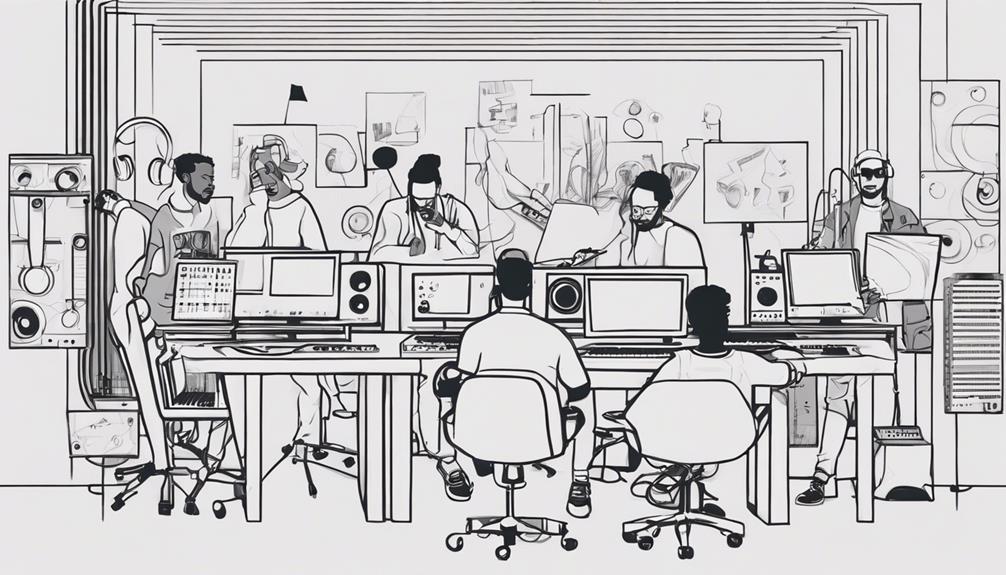
As you navigate through music production school, remember that networking is key to building industry connections that can shape your career.
Collaborating with your peers not only enhances your skills but also opens doors to live project opportunities where you can apply your knowledge in real-world settings.
Building Industry Connections
Establishing industry connections in music production is crucial for expanding your opportunities and gaining valuable experience.
Networking within the music production industry can open doors to collaborations, job opportunities, and industry insights.
Attending industry events, workshops, and conferences is a great way to meet professionals and expand your network.
Online platforms like LinkedIn and music production forums also offer excellent opportunities to connect with industry professionals.
Collaborating With Peers
Networking in music production opens doors to valuable collaborations with talented peers in the industry, providing opportunities to learn and grow together. Collaborating with peers not only allows you to exchange techniques and gain hands-on experience but also opens up possibilities for partnerships and innovative projects. By working with like-minded individuals, you can spark creativity and push the boundaries of music production.
These collaborations offer a chance to combine your strengths with those of your peers, resulting in a unique blend of skills and perspectives. Through networking and collaborating with peers, you can tap into a pool of diverse talents and ideas that can enhance your own work and lead to exciting new projects.
Additionally, building strong relationships with your peers can provide ongoing support, constructive feedback, and valuable connections within the music production community. Embrace the opportunities that collaborating with peers brings, as they can be instrumental in your growth and success in the music production industry.
Live Project Opportunities
Engage in live project opportunities to immerse yourself in real-world music production scenarios, fostering collaboration and networking with industry peers and professionals.
Music production schools offer these invaluable chances for hands-on experience, allowing you to work alongside fellow musicians, artists, and industry experts. Through these live projects, you not only enhance your practical skills but also have the opportunity to showcase your talent and build your portfolio.
Networking plays an important role during live projects, as it can lead to future collaborations and job prospects within the music industry. By participating in these initiatives, you gain insights into the dynamics of teamwork and the production process in a professional setting.
Embrace these live project opportunities to not only learn from experienced professionals but also to establish connections that can propel your music production career forward.
Essential Equipment for Music Production
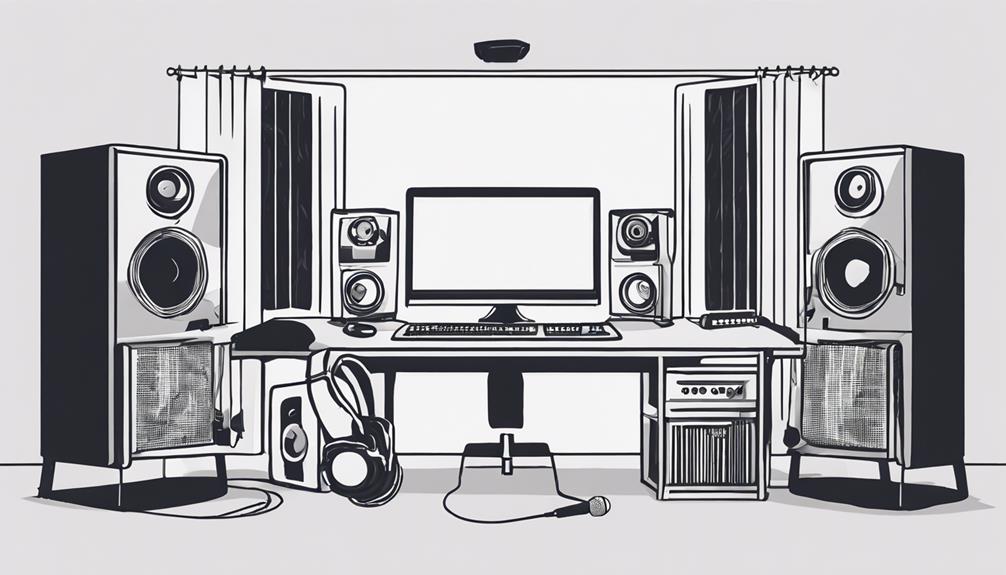
When diving into music production, ensuring you have the essential equipment is paramount for a successful setup. Key items include a computer loaded with a Digital Audio Workstation (DAW) for recording and editing, a MIDI keyboard for inputting musical notes, an audio interface for connecting instruments and microphones, and studio monitors for accurate sound playback.
Additionally, a quality microphone is essential for recording vocals and instruments, while studio acoustic treatment such as foam panels and bass traps helps control room acoustics for better sound quality.
While not mandatory, MIDI controllers, synthesizers, and drum machines can enhance creativity and streamline workflow in music production. It's also beneficial to invest in comfortable furniture like a chair and desk, along with adequate lighting to create a conducive work environment for long hours of music production.
Developing Skills for Success
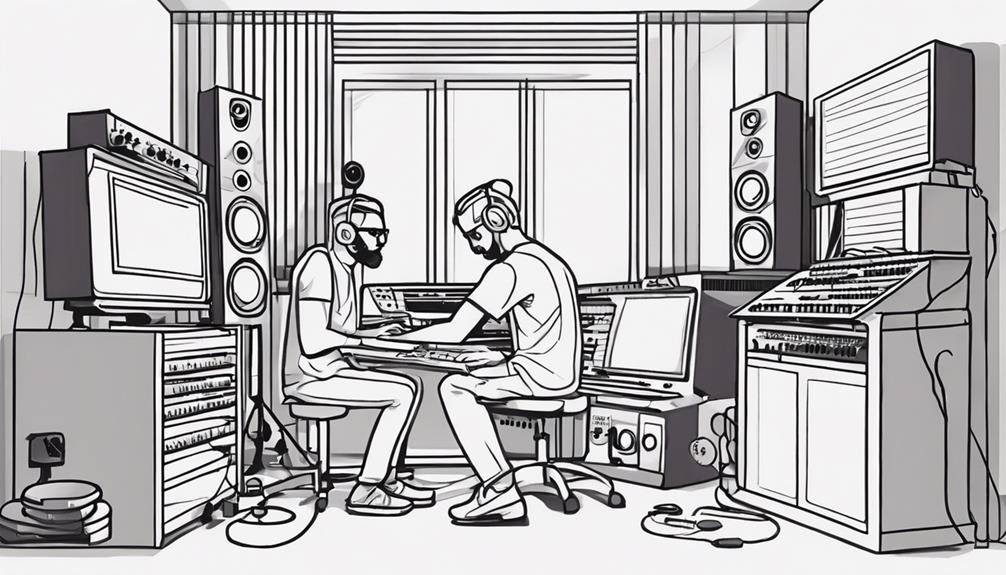
To succeed in music production, honing your skills in music theory, composition, and instrument proficiency is vital. As a music producer, mastering music production software like Ableton Live and Logic Pro is essential for creating professional-quality tracks. Understanding the features of Digital Audio Workstations (DAWs), utilizing plugins, effects, and sound synthesis techniques are fundamental in producing unique and polished music.
Proficiency in mixing, mastering, and audio manipulation plays a significant role in enhancing the overall quality of your music productions.
Continuous practice, experimentation, and learning from industry professionals are key aspects of skill development in music production. By immersing yourself in the world of music production, exploring different recording techniques, and staying updated on the latest trends in the industry, you can elevate your skills and stand out as a skilled producer.
Balancing Passion and Dedication
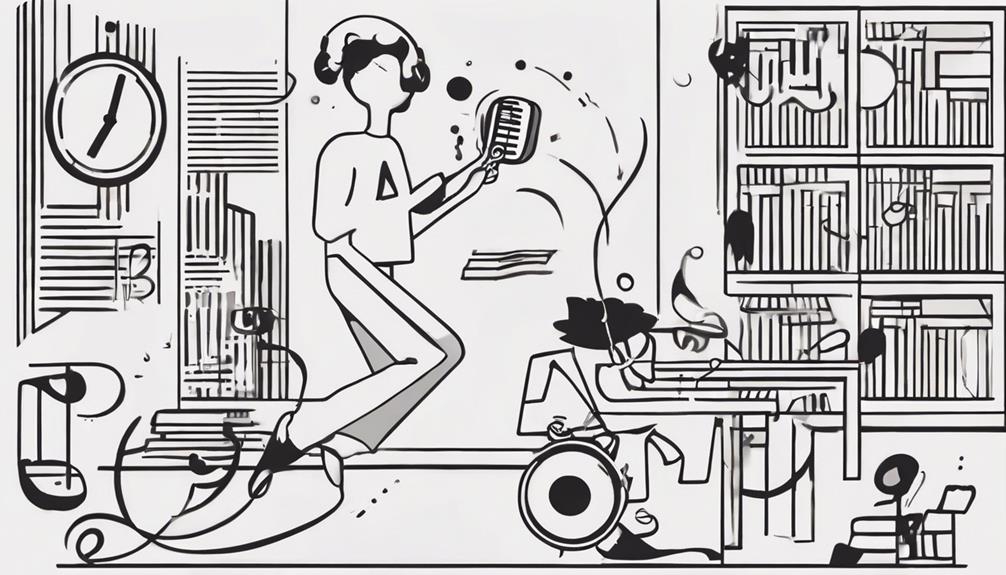
Finding the right balance between your passion for music production and your dedication to mastering the necessary skills is key to success in your education journey. Pursuing formal education in music production requires a deep passion for music, coupled with dedication to honing technical skills and exploring the creative aspects of the craft.
It's essential to understand the demands of the industry and the level of dedication needed to thrive in a music production program. Developing a strong work ethic is vital for managing the challenges of balancing career aspirations and passion for music.
Navigating the Music Production Industry
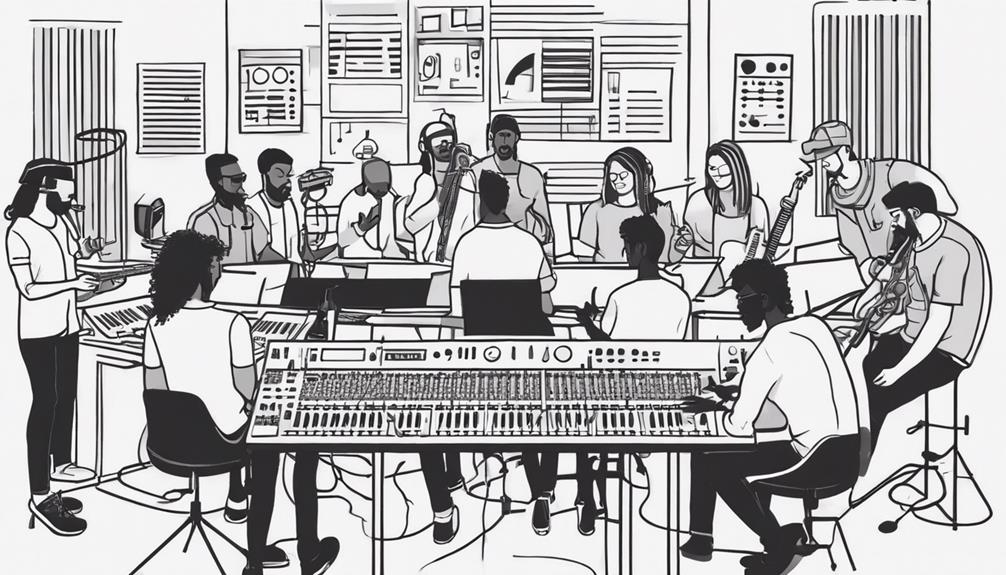
Understanding the dynamics of the music production industry involves delving into various facets such as audio engineering, music theory, composition, and sound design.
Music producers play a pivotal role in overseeing the entire production process, collaborating closely with artists and engineers to bring musical visions to life.
Genres spanning pop, rock, hip-hop, and electronic music all fall under the vast umbrella of the music industry.
To navigate this career successfully, it's critical to hone strong interpersonal skills for effective collaboration in the studio environment.
Familiarity with digital audio workstations (DAWs) and recording studios is paramount in this fast-paced field.
Keeping abreast of industry trends and emerging technologies is key to remaining competitive in the ever-evolving music production landscape.
Frequently Asked Questions
What Degree Should I Get for Music Production?
For music production, consider a Bachelor's in Music Production, Audio Engineering, or Music Technology. Specialized Master's degrees in Music Production or Sound Design offer advanced training. Look for accredited programs recognized by industry pros for quality education.
Do You Need to Go to School to Learn Music Production?
Do you need to go to school to learn music production? Not necessarily. Many successful producers are self-taught. Formal education offers equipment access and networking, but online courses and internships provide alternative learning paths. Passion and dedication are essential.
How Do I Start My Career as a Music Producer?
To start your career as a music producer, begin by learning music production basics online, practice with a DAW, consider formal education, build a portfolio of your work, and network with industry professionals. Success awaits!
Where Do I Start Learning to Produce Music?
Begin by immersing yourself in online resources and courses to learn music production. Engage with tutorials, participate in forums, and practice consistently. Embrace trial and error, collaborate with others, and seek feedback to enhance your skills. As you progress, experiment with different software and tools to find what works best for your creative style. Learning how to learn music production also involves studying the techniques of successful producers and applying them to your own projects. Stay patient and persistent, as mastery takes time and dedication.
Conclusion
Now that you have all the tools and knowledge to pursue your dream of studying music production, remember that the road ahead may be challenging but also incredibly rewarding.
Just like your favorite artist's journey to success, your dedication and passion will guide you through any obstacles.
Keep pushing forward, keep creating, and never lose sight of the magic that music production can bring to your life.
You've got this!

